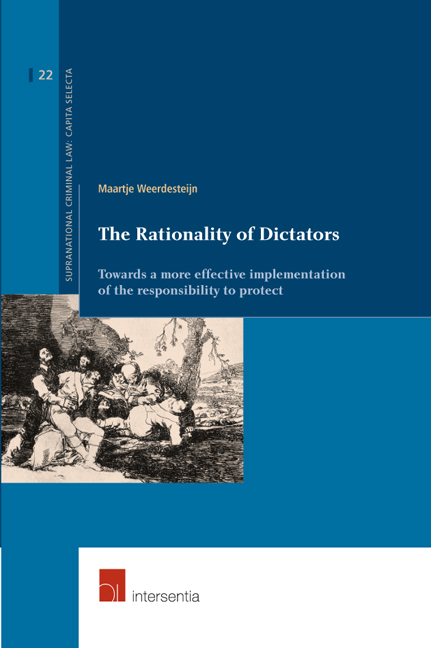 The Rationality of Dictators
The Rationality of Dictators Published online by Cambridge University Press: 28 September 2018
INTRODUCTION AND RESEARCH QUESTION
On January 7 1979, Pol Pot was forced to flee from Phnom Penh as Vietnamese forces enter the city. After years of having inflicted death and destruction on his own country and the contested border region with Vietnam, Pol Pot was finally removed from power. During his reign, the people of Cambodia were subjected to constant starvation, torture and were worked to death (Chandler, 1999). After just four years in power, between one and two million people had died – up to a quarter of the population (Chandler, 1999, p. 4; Kiernan, 2003, p. 587). Because Vietnam's invasion violated international law, it initially denied its involvement and placed the responsibility on an army of refugees that were trained by Vietnam (Bazyler, 1987, pp. 608-609; Morris, 1999, p. 109; Power, 2013, p. 141). Despite the fact that the invasion probably saved thousands of lives, it was harshly condemned by most countries (Hanlon, 2006b, pp. 60-61). Vietnam became a pariah state and the old regime of Pol Pot continued to be recognized as the legitimate government of the country, retaining its seat at the UN (Morris, 1999, pp. 221-222). Sovereignty, at this point in time, meant leaders were free to do as they pleased within the borders of their countries (Evans, 2008, p. 21).
Twenty years later, another intervention without explicit Security Council authorization, forced a different dictator to compromise in order to stay in power. During the war in Kosovo, Milosevic had initiated a brutal ethnic cleansing campaign that had displaced thousands of people. The violence was reminiscent of the horrible crimes that had been perpetrated just several years before when Yugoslavia fell apart, and NATO decided it was time for more decisive action. After Milosevic refused to sign the peace agreement at Rambouillet, they decided to start bombing Serbia proper in order to persuade Milosevic to return to the negotiating table (Power, 2013, pp. 444-451). While the war in Kosovo also angered many world leaders, a resolution to demand a cessation of the bombing campaign never made it through the Security Council (SC/6659, 1999).
The war in Kosovo led to difficult questions about the responsibility of the international community to protect populations from mass atrocities. The conflict, however, also highlighted how much the world, and the idea of sovereignty, had changed since the 1970s (Bellamy, 2009, p. 171; Cronin, 2007; Power, 2013, p. 467).
To save this book to your Kindle, first ensure [email protected] is added to your Approved Personal Document E-mail List under your Personal Document Settings on the Manage Your Content and Devices page of your Amazon account. Then enter the ‘name’ part of your Kindle email address below. Find out more about saving to your Kindle.
Note you can select to save to either the @free.kindle.com or @kindle.com variations. ‘@free.kindle.com’ emails are free but can only be saved to your device when it is connected to wi-fi. ‘@kindle.com’ emails can be delivered even when you are not connected to wi-fi, but note that service fees apply.
Find out more about the Kindle Personal Document Service.
To save content items to your account, please confirm that you agree to abide by our usage policies. If this is the first time you use this feature, you will be asked to authorise Cambridge Core to connect with your account. Find out more about saving content to Dropbox.
To save content items to your account, please confirm that you agree to abide by our usage policies. If this is the first time you use this feature, you will be asked to authorise Cambridge Core to connect with your account. Find out more about saving content to Google Drive.